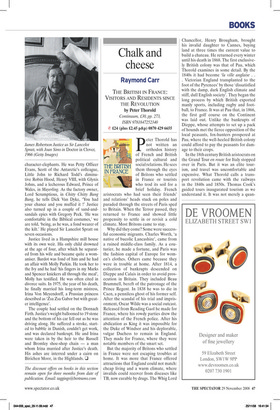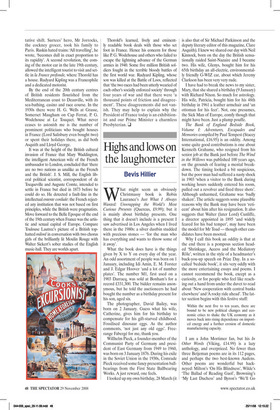Chalk and cheese
Raymond Carr
THE BRITISH IN FRANCE: VISITORS AND RESIDENTS SINCE THE REVOLUTION by Peter Thorold Continuum, £30, pp. 273, ISBN 9781847252340 ✆ £24 (plus £2.45 p&p) 0870 429 6655 Peter Thorold has not written an orthodox history of French and British political cultural and social relations. He sees them through the eyes of Britons who settled in France or tourists who trod its soil for a brief holiday. French aristocrats who had seen their friends’ and relations’ heads stuck on poles and paraded through the streets of Paris sped to Britain. When the Terror passed, they returned to France and showed little propensity to settle in or revisit a cold climate. Most Britons came to stay.
Why did they come? Some were successful economic migrants. Charles Worth, ‘a native of bucolic Lancashire’, came from a ruined middle-class family. As a couturier, he made a fortune, and Paris was the fashion capital of Europe for women’s clothes. Others came because they were in trouble at home. After 1814, a collection of bankrupts descended on Dieppe and Calais in order to avoid prosecution in Britain. They included Beau Brummell, bereft of the patronage of the Prince Regent. In 1838 he was to die in Caen, a penniless ghost of his former self. After the scandal of his trial and imprisonment, Oscar Wilde was a social outcast. Released from Reading Gaol he made for France, where his rowdy parties drew the attention of the French police. After his abdication as King it was impossible for the Duke of Windsor and his deplorable, vulgar Duchess to remain in England. They made for France, where they were notable members of the smart set.
But the majority of Britons who settled in France were not escaping troubles at home. It was more that France offered attractions that England could not match: cheap living and a warm climate, where invalids could recover from diseases like TB, now curable by drugs. The Whig Lord Chancellor, Henry Brougham, brought his invalid daughter to Cannes, buying land at three times the current value to build a chateau. He returned every winter until his death in 1868. The first exclusively British colony was that of Pau, which Thorold examines in some detail. By the 1840s it had become ‘la ville anglaise . . . Victorian England transplanted to the foot of the Pyrenees’ by those ‘dissatisfied with the damp, dark English climate and stiff, dull English society’. They began the long process by which British exported manly sports, including rugby and football, to France. It was at Pau that, in 1866, the first golf course on the Continent was laid out. Unlike the bankrupts of Dieppe, whose attempts to set up a pack of hounds met the fierce opposition of the local peasants, fox-hunters prospered at Pau, where the well-heeled British colony could afford to pay the peasants for damage to their crops.
In the 18th century British aristocrats on the Grand Tour en route for Italy stopped over in Paris. But it was an elite tourism, and travel was uncomfortable and expensive. What Thorold calls a transport revolution came with the railways in the 1840s and 1850s. Thomas Cook’s guided tours inaugurated tourism as we understand it. It was not merely a quan tative shift. Surtees’ hero, Mr Jorrocks, the cockney grocer, took his family to Paris. Ruskin hated trains: ‘All travelling’, he wrote, ‘becomes dull in exact proportion to its rapidity’. A second revolution, the coming of the motor car in the late 19th century, allowed the intelligent tourist to visit and settle in la France profonde, where Thorold has a house. Rudyard Kipling was a Francophile and a dedicated motorist.
By the end of the 20th century centres of British residents flourished from the Mediterranean coast to Deauville, with its sea-bathing, casino and race course. In the 1930s there were H. G. Wells at Grasse, Somerset Maugham on Cap Ferrat, P. G. Wodehouse at Le Touquet. What never ceases to astonish me is the number of prominent politicians who bought houses in France (Lord Salisbury even bought two) or spent their holidays there, as did both Asquith and Lloyd George.
It was at the height of the British cultural invasion of France that Mary Waddington, the intelligent American wife of the French ambassador to London, concluded that ‘there are no two nations as unalike as the French and the British’. J. S. Mill, the English liberal political scientist, correspondent of de Tocqueville and Auguste Comte, intended to settle in France but died in 1873 before he could do so. He detected a fault-line in the intellectual entente cordiale: the French rejected any institution that was not based on first principles, while the British were pragmatists. Move forward to the Belle Epoque of the end of the 19th century when France was the artistic and sexual capital of Europe. Compare Toulouse Lautrec’s picture of a British tophatted milord in conversation with two chorus girls of the brilliantly lit Moulin Rouge with Walter Sickert’s sober studies of the English music-hall. They are worlds apart. Thorold’s learned, lively and eminently readable book deals with those who set foot in France. Hence his concern for those like P. G. Wodehouse and others who failed to escape the lightning advance of the German armies in 1940. Some five million British soldiers fought in the terrible bloody battles of the first world war. Rudyard Kipling, whose son was killed at the Battle of Loos, reflected that ‘the two races had been utterly wearied of each other’s socially enforced society’ through four years of war and that there were ‘a thousand points of friction and disagreement’. These disagreements did not vanish. They may help to explain why the President of France today is an exhibitionist and our Prime Minister a charmless Presbyterian. ❑



































































































 Previous page
Previous page